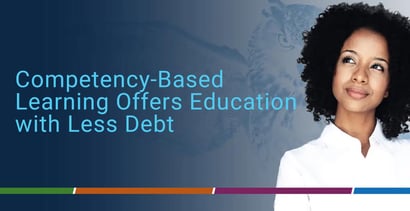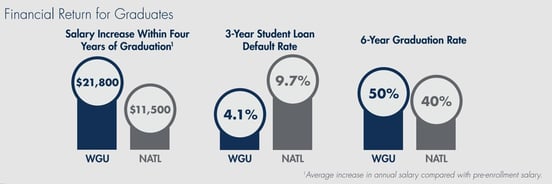

In a Nutshell: Competency-based educational programs allow students to learn at their own pace, quickly prove proficiency, and spend more time on subjects they find challenging. Western Governors University has offered students those flexible online learning options for more than 20 years. Virtual classes allow students to maintain their jobs and lifestyles rather than making drastic changes to attend in-person classes. WGU degrees also cost significantly less than those from traditional institutions, making them an attractive option for reducing student loan debt.
In early 2020, shortly after students had arrived on college campuses for the spring semester, they had to vacate classrooms, libraries, and dormitories. That’s because the COVID-19 pandemic brought higher education to a grinding halt in a way few disasters could.
Daily life changed for everyone, but online learners remained largely unaffected. Schools began rapidly designing more widespread online learning programs to serve students amid an uncertain public health crisis.
“Traditional colleges were interrupted, and they all put something together to teach online,” said Bob Collins, VP of Financial Aid at Western Governors University. “Unfortunately, the majority of students were underwhelmed by the new experience. The fact is that not all online teaching and learning is created equal. That’s why students come to us because they want to have a better experience.”

WGU has provided affordable, competency-based online education to adults across the United States for more than 20 years. The education is self-paced and allows students to quickly complete courses in which they’re proficient while spending extra time on subjects they find more challenging.
Students can learn from the comfort of their homes on their own schedules. Tuition is far less than at traditional universities, enabling more students to advance their educations and careers without accruing massive student debt.
“I’ve been a practitioner for 40 years now,” Collins said. “I am sick and tired of reading the headline news about $1.6 trillion in student loan debt. That’s a problem, and it’s growing exponentially. So instead of sitting around commiserating about the problem, we took action.”
Learners Maintain Their Lifestyles While Earning Degrees
Online learning allows students to pursue education from anywhere. That means they don’t have to uproot themselves or their families, to move to a college town or metropolitan area. They can maintain their lifestyles, current jobs, and continue earning and paying their bills while working toward a degree.
“Our students are working adults. They have full-time jobs, they’ve got families, they’ve got mortgages, car payments. They just don’t have that degree,” Collins said. “And so it’s accessible for the students to continue with their life working and going back to school, and it’s available to them at their convenience no matter where they are. Whether they’re in rural America or traveling in a hotel room, they can access the academic programs.”
While learning is always a constructive pursuit, it’s often a way for people to get a better job and raise their income. When it comes to credentials, the name of a particular school does carry weight, but it’s knowledge and proficiency that carry the day.
Within two years of graduation, WGU alumni see an average $12,300 rise in earnings — almost twice the national average of $6,200. After four years, they see an average increase of $21,800, nearly double the $11,500 national average.
In many cases, students who have jobs are eligible for tuition assistance from their employers who understand the value of investing in workers. And remote, competency-based education can offer enormous savings on tuition, circumventing lost earnings and minimizing the need for costly student loans and debt that can burden students for decades after graduation.
Competency-Based Models Enable Accelerated Learning
Unlike traditional degree programs, WGU offers a more flexible enrollment model. Classes begin on the first of every month rather than three times a year, making it much easier to fit education into a busy schedule.
Students can enroll in WGU for six-month terms at an annual cost of $6,670 for a bachelor’s degree and $7,405 for a master’s — substantially lower than a traditional institution. And that cost isn’t simply tuition; it also covers fees, textbooks, and other learning resources. Those are additional expenses at brick-and-mortar schools.
Within a six-month term, students can learn at their own pace. The beauty of competency-based learning is that proficiency is all that matters. If students can demonstrate understanding and capability, they can quickly complete a course and move on to another.

WGU students pay less for their education, on average, and typically have higher salaries after graduation.
“We’re very liberal on our transfer credit policy,” Collins said. “Competency-based education simply means you know and can do. You have the will to demonstrate your abilities and pass an assessment to prove that. You may be a small business owner who has got a boutique shop on Main Street. You keep the books, and you make payroll. So you could probably pass the accounting course pretty quickly here because you’re so familiar with it.”
The model also means students can truly learn at their own pace. They can complete a course in two weeks rather than spending four months on something they already know. Or they can take extra time to learn challenging material and feel more confident in their abilities when it comes time for assessment.
“Our competency-based learning model is what differentiates us from the standard higher education system,” Collins said. “All of your college experience, life experience, and work experience, you bring that with you. You can then move quickly through the content you know and spend more time on the content that you need to learn.”
Pandemic Challenges Demonstrate the Need for Flexibility
WGU has demonstrated that online learning is a viable option for earning a degree. Just as importantly, it proves that a quality education can cost significantly less than traditional courses of study.
The traditional model is familiar, known, and accepted, and institutions are in no hurry to change that model. The enormous burden of student debt in the United States proves how profitable it can be.

Bob Collins, VP of Financial Aid at Western Governors University
But a crisis can destabilize and disrupt tradition in industries across the board. When schools attempted to implement large-scale online learning programs in early 2020, they demonstrated remote learning works.
And in the wake of the COVID-19 pandemic, remote learning has become a mainstay for traditional and nontraditional students. Industries, including foodservice and hospitality, took a massive initial hit, leaving many workers temporarily furloughed or out of work entirely.
Without income and increasingly saddled with consumer debt, many people turned to self-improvement. An affordable, flexible education is a viable way for workers to add new skills. That also makes them more marketable amid a significant economic upheaval that will have lasting effects.
“Individuals, no matter how old you are, you’re going to need to upskill,” Collins said. “I think the pandemic has proven that there are going to be jobs that will never come back. Some people in the hospitality industry need new skills. Those are the kinds of opportunities that I envision going forward with respect to the return on investment.”
Disrupting Higher Education Benefits Future Students
In early 2020, many colleges and universities — much like hospitality and food service workers — found themselves facing an uncertain future. At WGU, with its decades of experience in online learning, very little changed for the staff or students.
WGU saw a 10% rise in enrollment in 2020. That demonstrates an ongoing interest in online competency-based learning programs and an increase in demand.
Collins said he only expects that trend to increase in the future.
A prime driver of demand for online education will be Gen Z and future generations who function well in digital environments. Those generations have grown up with electronic devices and screens in their hands and are comfortable with virtual learning.
“They’re online and very comfortable in that environment. They don’t need to go to a traditional university,” Collins said. “I think online learning is now going to be more ubiquitous. Everybody’s tried it. Everybody likes it. Some schools will go back to the traditional, residential, face-to-face teaching, and that’s fine. But online learning has demonstrated its ability to deliver quality education done right.”
Advertiser Disclosure
BadCredit.org is a free online resource that offers valuable content and comparison services to users. To keep this resource 100% free for users, we receive advertising compensation from the financial products listed on this page. Along with key review factors, this compensation may impact how and where products appear on the page (including, for example, the order in which they appear). BadCredit.org does not include listings for all financial products.
Our Editorial Review Policy
Our site is committed to publishing independent, accurate content guided by strict editorial guidelines. Before articles and reviews are published on our site, they undergo a thorough review process performed by a team of independent editors and subject-matter experts to ensure the content’s accuracy, timeliness, and impartiality. Our editorial team is separate and independent of our site’s advertisers, and the opinions they express on our site are their own. To read more about our team members and their editorial backgrounds, please visit our site’s About page.




